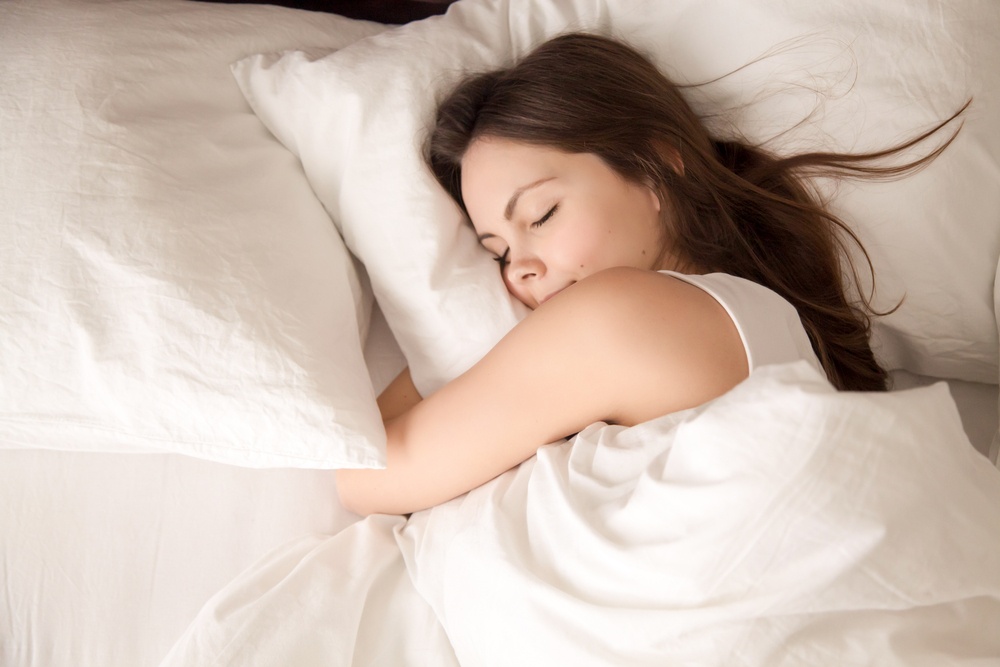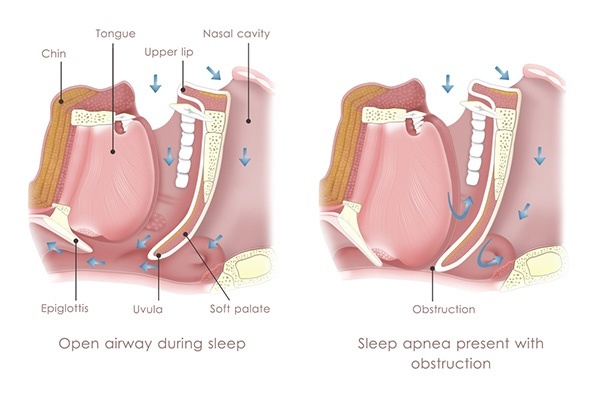
It’s recommended that adults get seven to nine hours of sleep per night. That can be a tall order in the best of circumstances, but when you’re suffering from obstructive sleep apnea, it probably seems impossible. While you might have no idea you’re even waking up multiple times during the night, you certainly feel the fatigue and lack of quality sleep in the morning. Because sleep deprivation can have such a negative impact on your physical and mental health, figuring out tips on how to get better sleep with sleep apnea will go a long way in helping you reclaim your life. Not sure where to start? As a Naperville general dentist and speciality practice, we have you covered. We’re sharing 7 ways to get better sleep with sleep apnea.
What is Sleep Apnea?
Let’s have a quick refresher on what sleep apnea is before we dive into our tips. Obstructive sleep apnea is a sleep disorder where breathing stops and starts throughout the night, sometimes hundreds of times. The airway becomes blocked, usually due to the soft tissues in the back of the throat collapsing. This causes you to stop breathing for 10 seconds or longer before you awaken, sometimes gasping for air, and your breathing resumes. This cycle repeats itself throughout the night. Patients are considered to have severe sleep apnea when breathing stops and starts 30 times an hour or more.
Obstructive sleep apnea leads to irregular sleep patterns, preventing you from getting the quality of sleep you need, as well as decreased blood oxygen levels. This combination of lack of deep sleep and decreased oxygen can cause a number of serious problems, including:
- Daytime fatigue
- Depression
- Irritability
- Learning difficulties
- Memory issues
- Accidents, including car accidents and workplace accidents
- Sexual dysfunction
- Hypertension
- Heart disease
- Stroke
- Death
With such potentially severe consequences, it’s no wonder the first question most people ask is, can sleep apnea be cured? While mild cases of sleep apnea that are due to a person being overweight could potentially be resolved by the person losing weight, and there are surgical options for extreme cases that could alleviate the issue, in general, sleep apnea can’t necessarily be cured permanently. However, there are a number of sleep apnea treatments, ranging from using a sleep apnea machine, known as a CPAP machine, to wearing a custom dental device for snoring and sleep apnea, which we’ll get to shortly.
What are the Signs of Sleep Apnea?
The only way to know for certain if you have sleep apnea is to visit a specialist for an evaluation. Often, you’ll be referred for a sleep study. However, if you experience any of the common signs of sleep apnea, you should seek help. So, what are the signs of sleep apnea? The signs and symptoms include:
- Loud snoring
- Gasping for air while asleep
- Instances where you stop breathing while sleeping (noticed by another person)
- Headache upon awakening
- Waking up with a dry mouth
- Having a hard time staying asleep
- Excessive daytime sleepiness
- Irritability
- Problems paying attention
Table of Contents
 7 Tips for How to Get Better Sleep With Sleep Apnea
7 Tips for How to Get Better Sleep With Sleep Apnea
Just because you have obstructive sleep apnea doesn’t mean you’re destined for poor quality sleep forever. There are a number of things you can do to sleep longer and experience fewer breathing disturbances:
1. Learn How to Sleep With Sleep Apnea
It’s important to understand the basics of how to sleep with sleep apnea since your sleeping position can make it worse. Sleeping on your back, known as the supine position, increases the likelihood that the soft tissues of the back of the throat will relax and block the airway because gravity will draw them down. Sleeping on your side is the better option and it may decrease the number of apnea episodes. We know switching sleep positions is easier said than done. One study found that sewing a tennis ball to the back of the shirt helped people with positional obstructive sleep apnea stop sleeping on their backs, at least in the short-term. While you may not have to go to that extreme, it can be beneficial to find ways to get comfortable with sleeping on your side.
2. Lose Weight if Necessary
While not everyone who has obstructive sleep apnea is overweight, being overweight or obese is a risk factor for developing sleep apnea. When you gain weight, you also gain fatty deposits around the neck and tongue that can restrict the airway. If you are overweight, losing weight will likely improve sleep apnea symptoms. According to the Sleep Foundation, weight loss of 10 to 15% of a person’s body weight can decrease the severity of obstructive sleep apnea by 50% in moderately obese patients. Yet, even if you’re carrying just a few extra pounds, losing weight might help you breathe easier and sleep better.
3. Limit Alcohol and Quit Smoking
Alcohol causes decreased muscle tone in the mouth and the back of the throat, which impedes airflow and can exacerbate snoring and sleep apnea. It can also interfere with the muscles that are involved in breathing and in how the brain controls sleep. While we’d never ask you to give up the occasional glass of wine completely, it’s a good idea to limit your alcohol intake, particularly close to bedtime. Smoking is also a culprit when it comes to worsening sleep apnea. Cigarettes cause inflammation in the upper airway, which impacts breathing. Quitting smoking will help with sleep, breathing and your health in general.
4. Practice Good Sleep Hygiene
Practicing good sleep hygiene on its own may not help you get rid of sleep apnea. However, good sleep hygiene will enable you to sleep more soundly overall and it can ensure that once you’ve used other methods or you’ve sought out sleep apnea treatment, you’re maximizing your ability to get some shut eye. Some ways to boost your sleep hygiene include:
- Using your bedroom for sleep only
- Avoiding device screens like your phone, tablet or laptop, which emit blue light, at least an hour before you turn in at night
- Developing a sleep schedule and sticking with it (i.e., going to bed and waking up at the same time every day, even on the weekends)
- Avoiding caffeine, large meals and alcohol close to bedtime
- Keeping your room dark, soothing and at a comfortable temperature
- Doing something relaxing before bed like taking a bath or reading
5. Exercise
Exercise is a key way to improve sleep and may also help you sleep better with sleep apnea. Moderate aerobic exercise can boost the amount of slow wave sleep, or deep sleep, you get at night. However, any exercise, whether cardio or weight training, might do the trick. Researchers analyzed eight studies on exercise and sleep apnea and found that doing any type of exercise, including walking, running, riding a stationary bike and doing strength training, as few as two days a week or as many as seven days a week, improved obstructive sleep apnea symptoms in patients. Patients also had better overall sleep and less daytime drowsiness. The improvements were independent of any weight loss, indicating it’s the exercise itself that helped participants sleep better.
6. Invest in a Humidifier
There’s a reason why many sleep apnea machines have built-in or attachable humidifiers. It’s because dry air can irritate your nose and throat making you more likely to snore and breathe with your mouth open while sleeping. While a humidifier isn’t a sleep apnea treatment or cure and won’t make sleep apnea disappear, it can help you get a better night’s sleep and breathe more comfortably.
7. Consider an Oral Appliance
An oral appliance for sleep apnea is more comfortable and less burdensome than a CPAP and most patients prefer it to more invasive options. At Naperville Dental Specialists, we offer the SomnoDent® Mandibular Advancement Splint (MAS). The custom oral appliance can treat mild, moderate and even severe sleep apnea. It shifts the lower jaw slightly forward, which tightens the soft tissues and muscles in the back of the throat to prevent obstruction during sleep.
It’s also an excellent dental device for snoring because it stops the tissues of the upper airway from vibrating as air passes over them, which is the main cause of snoring. Oral appliances are a tried and true method for getting better sleep with sleep apnea and they don’t interfere with your daily life or require significant upkeep. Your sleep partner will appreciate you using a dental device for snoring too!
We hope our tips for getting better sleep with sleep apnea help you breathe easier and wake up more well rested. If you’re struggling, schedule an evaluation at Naperville Dental Specialists online or by calling us at (630) 848-2010. Dr. Anthony LaVacca and our expert team offer sleep apnea treatment in Naperville to help you improve your sleep and quality of life.

 7 Tips for How to Get Better Sleep With Sleep Apnea
7 Tips for How to Get Better Sleep With Sleep Apnea 






























